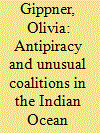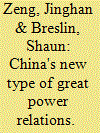| Srl | Item |
| 1 |
ID:
151696


|
|
|
|
|
| Summary/Abstract |
Piracy and threats from non-state actors in the Gulf of Aden have triggered states to cooperate in securing waterways and the sea lines of communication, a development that is fundamentally transforming the region’s maritime security environment. As a result, not only has this region’s strategic importance been reaffirmed, but it has also gained tremendous importance through the presence of several actors, especially China and India. Since 2008, these two countries have been involved in larger global actions against piracy, which has led to increasing contact between their navies and more exposure of their capabilities. Will the broader Indian Ocean region emerge as an area of cooperation or competition between China and India? Drawing on interviews carried out with Chinese and European experts from 2012 to 2015, this article explores the reasons for and instruments of cooperation in antipiracy and the degree to which China uses antipiracy efforts as confidence-building measures.
|
|
|
|
|
|
|
|
|
|
|
|
|
|
|
|
| 2 |
ID:
146484


|
|
|
|
|
| Contents |
The rise of China has been reshaping how the country sees its own role in the world. China has become increasingly willing to move from being a norm and system taker to a norm and system shaper (if not yet maker). One example is Xi Jinping's promotion of ‘a new type of Great Power relations’ designed to create a strategic space in which to operate. By using a mixed quantitative/qualitative analysis, we analyse 141 Chinese articles titled with ‘new type of Great Power relations’. We find that although Chinese analysts and policy makers rejected the idea of a G2 in 2009, the mainstream discourse has rapidly shifted to what we call a ‘G2 with Chinese characteristics’ which indicates a fundamental shift in Chinese evaluation of the power status of itself and others. While some Chinese scholars consider China to have already achieved the status as the world's No. 2 or even a superpower, the mainstream discourse views China as both a Great Power and a rising power at the same time. This, we argue, moderates the expectations of what China can and should do to resolve global problems despite its great power status.
|
|
|
|
|
|
|
|
|
|
|
|
|
|
|
|
| 3 |
ID:
185210


|
|
|
|
|
| Summary/Abstract |
Singapore remained in crisis mode in 2021, a situation that persisted from 2020. While COVID-19 continued to devastate various foundations of Singapore, especially the economy and public confidence in the government, a political succession crisis threw the republic deeper into uncharted territory. These developments are likely to have long-term consequences, especially for the staying power of government in what is a one-dominant-party state.
|
|
|
|
|
|
|
|
|
|
|
|
|
|
|
|
| 4 |
ID:
190043


|
|
|
|
|
| Summary/Abstract |
As in 2021, Singapore in 2022 remained largely in crisis mode despite resolving the keystone issue of political succession, with a prime-minister-in-waiting clearly in place. Still, COVID-19, together with the continued US–China economic and political conflicts, the negative fallout from the Russian invasion of Ukraine, and the anticipation of a possible recession in 2023, continued to cast dark clouds over Singapore and its politico-economic future. These developments were somewhat counterbalanced by positive developments in regional diplomacy, which acted as possible shock absorbers of negative fallout from outside the region. Still, Singapore appears to be at a crossroads, with political changes at home being challenged by external developments, and with the shape of things to come in Singapore remaining largely unknown.
|
|
|
|
|
|
|
|
|
|
|
|
|
|
|
|